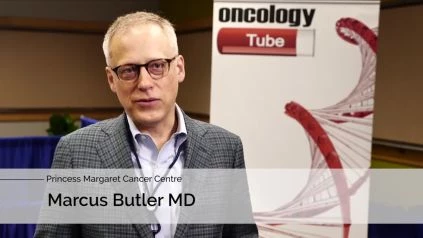Marcus Butler, MD discusses TBI-1301-Effect of minimal lymphodepletion prior to ACT with TBI-1301, NY-ESO-1 specific gene-engineered TCR-T cells, on clinical responses and CRS
Background: Adoptive transfer of T cell receptor (TCR) gene-engineered T cells can induce durable anti-cancer responses. Post-infusion cytokine release syndrome (CRS) has been associated with clinical utility. Pre-infusion lymphodepletion (LD) may influence CRS, graft persistence, and clinical responses. While the optimal LD regimen is not yet defined, most include both cyclophosphamide (CY) and fludarabine (FLU). TBI-1301 is a novel gene therapy produced by engineering autologous lymphocytes to express an NY-ESO-1-specific TCR using a retrovirus vector that encodes siRNA to silence endogenous TCR. Since less intensive LD may be sufficient with the use of this novel vector, we are conducting a study where patients are treated with TBI-1301 following LD with CY alone. Methods: Eligibility includes informed consent, HLA-A*02:01 or A*02:06 haplotype, and NY-ESO-1 expression by immunohistochemistry. Eligible patients undergo harvest of PBMC which are then processed locally to generate engineered TBI-1301 cells. The study design is to infuse 5×109 cells (day 0) to patients following LD with CY (750 mg/m2 on day -3 and -2). Endpoints include safety, efficacy, and biological correlates for persistence of NY-ESO-1-specific T cells post infusion. Results: Thus far, 9 patients have been treated, and 8 have received the target dose. To date, 8 patients are evaluable for response and toxicity, and no DLTs have been observed. Despite LD with CY alone, all 4 patients with synovial sarcoma and 1 with melanoma experienced clinical and laboratory evidence of grade 1-2 CRS with increased CRP, ferritin, and IL-6 levels. CRS resolved spontaneously in all but one patient who required tocilizumab due to grade 2 nausea/vomiting. Two subjects experienced grade 3 tumor-associated pain. Other treatment-associated grade 3 or 4 toxicities included neutropenia and hypophosphatemia. Best overall response by RECIST is as follows: 2 partial responses, 5 stable disease, and 1 progressive disease. Biomarker analysis demonstrates persistence of transferred TBI-1301 cells, > 100 days in some patients. Conclusions: TBI-1301 appears to be safe and to possess anti-tumor activity. Despite LD with CY alone, grade 1-2 CRS is induced. Additional cohorts to this study will examine the role of repeat infusions to enhance anti-tumor activity. Clinical trial information: NCT02869217.

